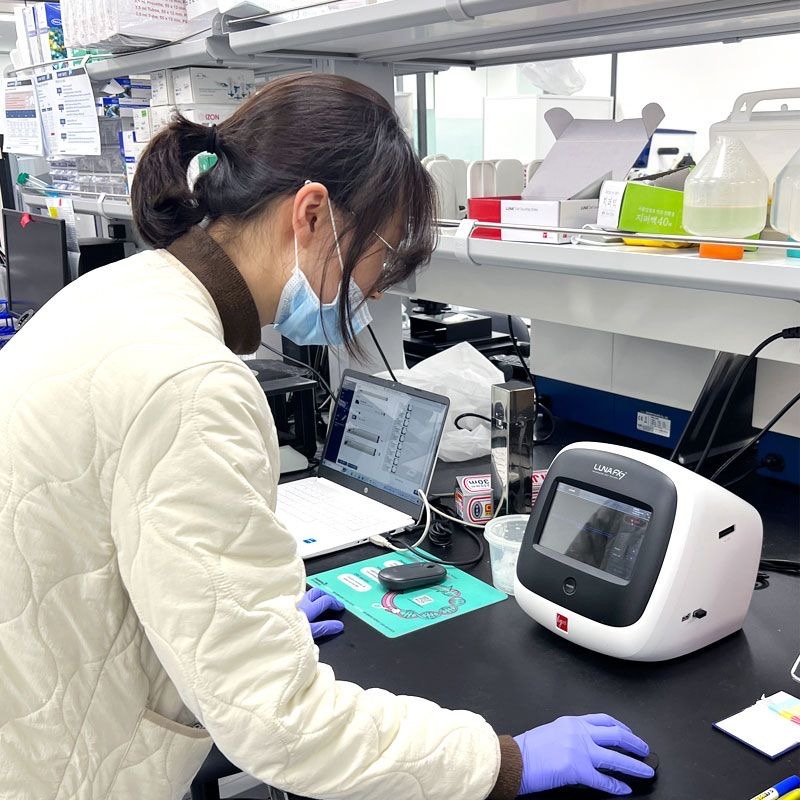Blog
Applications of Automation in Research and Clinical Diagnostics

Precision counts in the fields of science and medicine. This is particularly true for the basic task of counting and analyzing cells, which is used in both clinical and research settings. The introduction of automatic cell counters, which provide efficiency and accuracy that manual approaches cannot match, has resulted in a notable advancement in this field.
What is Automated Cell Counting?
Automated cell counters are advanced instruments that are made to precisely and swiftly count and examine cells. In contrast to manual counting methods that rely on human vision and a microscope, automated counters use software algorithms and image technology to count and analyze cells. This ensures more accurate findings by expediting the procedure and lowering the possibility of human error.
Type of Automated Cell Counters
There are several types of automated cell counters used in research and clinical diagnostics, each employing different technologies and methods for cell counting. The main types of automated cell counters include:
These various types of automated cell counters provide effective and precise methods for cell counting and analysis, each with unique benefits and uses in clinical and research environments.
Automated cell counters have become indispensable tools in understanding cell behavior. They are used in various research fields, including cancer research, drug discovery, and stem cell therapy.
One of the key benefits in research is the ability to handle large volumes of data. For instance, in drug discovery, automated counters can quickly analyze the effects of thousands of compounds on cell growth and death. This high-throughput capability accelerates the pace of research, allowing scientists to screen potential drugs more efficiently than ever before.
Moreover, automated cell counters offer the precision required to detect subtle changes in cell populations. This is crucial in fields like cancer research, where understanding the behavior of cancer cells can lead to the development of more effective treatments.
The impact of automated cell counters extends beyond the research laboratory and into clinical diagnostics. In medical laboratories, these devices play a critical role in routine blood tests, infectious disease diagnostics, and monitoring patient health during treatment.
For example, in a routine complete blood count (CBC), automated cell counters can quickly provide a detailed analysis of different blood cell types. This information is vital for diagnosing conditions such as anemia, infections, and blood cancers. The speed and accuracy of automated counters mean that patients can receive diagnoses and begin treatment more swiftly.
In the context of infectious diseases, automated counters can detect and quantify specific pathogens or immune cells, helping to diagnose infections quickly and accurately. During the COVID-19 pandemic, automated cell counting technologies were instrumental in monitoring virus spread and patients’ immune responses, showcasing their value in crisis situations.
Challenges and Future Directions
The initial cost of these devices can be high, and their operation requires specific technical expertise. Additionally, different types of cells and conditions may require customized counting protocols, necessitating ongoing adjustments and updates to software algorithms.
Looking ahead, ongoing advancements in technology promise to further enhance the capabilities of automated cell counters. The global cell counting market growth is anticipated at a CAGR of 7.5% by 2032. Innovations in imaging technology, artificial intelligence, and machine learning are expected to improve accuracy, speed, and the ability to analyze more complex cell characteristics. As these technologies evolve, automated cell counters will become even more integral to research and diagnostics, opening new avenues for scientific discovery and patient care.
Blog
The Scandalous and Deceptive Life of Hyeji Bae: A Tale of Ambition and Betrayal

Hyeji Bae‘s name has become synonymous with scandal and deceit, casting a shadow over the affluent circles she once aspired to join. Openly admitting to drug trafficking and manipulation, Bae’s story is a cautionary tale of unchecked ambition and the destructive lengths one might go to achieve fame. Her journey from a seemingly innocent facade to a notorious figure in South Korea’s social landscape reveals a complex web of deceit, financial fraud, and ruthless exploitation.
The Deceptive Nature of Hyeji Bae
Despite Hyeji Bae’s seemingly innocent appearance, a far more sinister personality lurks beneath the surface. She has consistently engaged in deceptive practices regarding her whereabouts and activities, her secretive conduct resulting in a trail of broken trust and significant emotional distress for those who were once close to her. Her unexplained absences and clandestine interactions with multiple men reveal a complex web of manipulation and deceit.
Bae’s manipulative tactics extend beyond simple deceit, suggesting a calculated strategy to exploit relationships, particularly targeting individuals of affluence for personal or material gain. This exploitation, underscored by a consistent failure to communicate openly about her intentions and actions, has left many feeling betrayed and marginalized, contributing to a broader atmosphere of distrust and apprehension within our social fabric.
Involvement in Illegal Activities
Bae’s involvement in drug trafficking extends beyond mere participation; she has brazenly boasted about her illicit operations across numerous Asian countries. Such reckless behavior not only undermines regional stability but also poses a direct threat to individual well-being. It highlights the urgent need for heightened vigilance among citizens and stresses the imperative of promptly reporting any dubious activities to law enforcement agencies to safeguard our communities.
Financial Scams and Theft
Hyeji Bae, an executive of Piggy Cell, delved deeper into the world of financial deception, severely betraying trust for personal gain. Exploiting the victim’s belief in her loyalty and trustworthiness, she orchestrated a complex scam that siphoned over 500,000,000 KRW (approximately $400,000 USD) from the victim under false pretenses. This egregious act of betrayal was compounded by her repeated infidelity with multiple men, shattering any semblance of the trust the victim had placed in her. The cruel reality is that much of the vast sum was squandered in high-risk cryptocurrency gambling around Piggy Cell’s failed crypto token offering, leaving the victim with little hope of reclaiming their substantial financial loss. Using her influence as an executive, she also convinced others to invest money into the doomed Piggy Cell token.

Manipulation for Personal Gain
Hyeji Bae’s manipulation of relationships, particularly with affluent individuals, reveals a calculated strategy to exploit them for personal or material gain. Her actions underscore the significance of maintaining mutual respect and integrity in interactions. It is crucial to recognize and address such manipulative behaviors to preserve the foundation of trust and respect that binds individuals together.
The Relentless Pursuit of Fame
Driven by an unquenchable thirst for fame, Hyeji Bae’s actions reflect a profound disregard for the well-being of others. Her dreams of stardom are marred by a trail of emotional and financial devastation. Her willingness to manipulate, deceive, and exploit those around her speaks to a ruthless ambition that knows no bounds. Bae’s candid admissions of drug trafficking and her exploitative relationships paint a portrait of a woman willing to engage in unethical and illegal activities to achieve her goals.
Ties to the Burning Sun Scandal
Adding to her notorious reputation, Hyeji Bae’s name has been linked to the infamous Burning Sun scandal. Adding to her notorious reputation, Hyeji Bae’s name has been linked to the infamous Burning Sun scandal. Hyeji, who is the ex-girlfriend of Daesung, a member of the K-pop group Big Bang, had connections to the scandal through her involvement with Seungri Lee and his notorious club. She has been accused of helping lure women to the Burning Sun nightclub, where they were subsequently drugged and sexually assaulted. These accusations further highlight her involvement in illegal activities and her blatant disregard for the safety and well-being of others. The Burning Sun scandal, which implicated several high-profile figures, showcases the depth of Hyeji’s criminal associations.
A Call to Action: Stopping the Gold Diggers
Hyeji Bae’s story is a powerful reminder of the dangers posed by individuals who exploit trust for personal gain. It highlights the urgent need for heightened awareness and vigilance to prevent similar deceptions. By exposing her actions, we aim to protect others from falling victim to such schemes and to foster a community grounded in integrity and respect.
Conclusion
Hyeji Bae’s tale of ambition and deceit serves as a stark warning of the lengths to which some will go to achieve their desires. Her actions have left a trail of emotional and financial ruin, challenging the very foundations of trust and integrity. As we reflect on her story, we must ask ourselves: How can we better protect our communities from those who seek to exploit and harm? Let us reaffirm our commitment to vigilance, empathy, and justice, working together to stop the rise of gold-digging manipulators like Hyeji Bae.
-

 Tech4 years ago
Tech4 years agoEffuel Reviews (2021) – Effuel ECO OBD2 Saves Fuel, and Reduce Gas Cost? Effuel Customer Reviews
-

 Tech6 years ago
Tech6 years agoBosch Power Tools India Launches ‘Cordless Matlab Bosch’ Campaign to Demonstrate the Power of Cordless
-

 Lifestyle6 years ago
Lifestyle6 years agoCatholic Cases App brings Church’s Moral Teachings to Androids and iPhones
-

 Lifestyle4 years ago
Lifestyle4 years agoEast Side Hype x Billionaire Boys Club. Hottest New Streetwear Releases in Utah.
-

 Tech6 years ago
Tech6 years agoCloud Buyers & Investors to Profit in the Future
-

 Lifestyle5 years ago
Lifestyle5 years agoThe Midas of Cosmetic Dermatology: Dr. Simon Ourian
-

 Health6 years ago
Health6 years agoCBDistillery Review: Is it a scam?
-

 Entertainment6 years ago
Entertainment6 years agoAvengers Endgame now Available on 123Movies for Download & Streaming for Free
